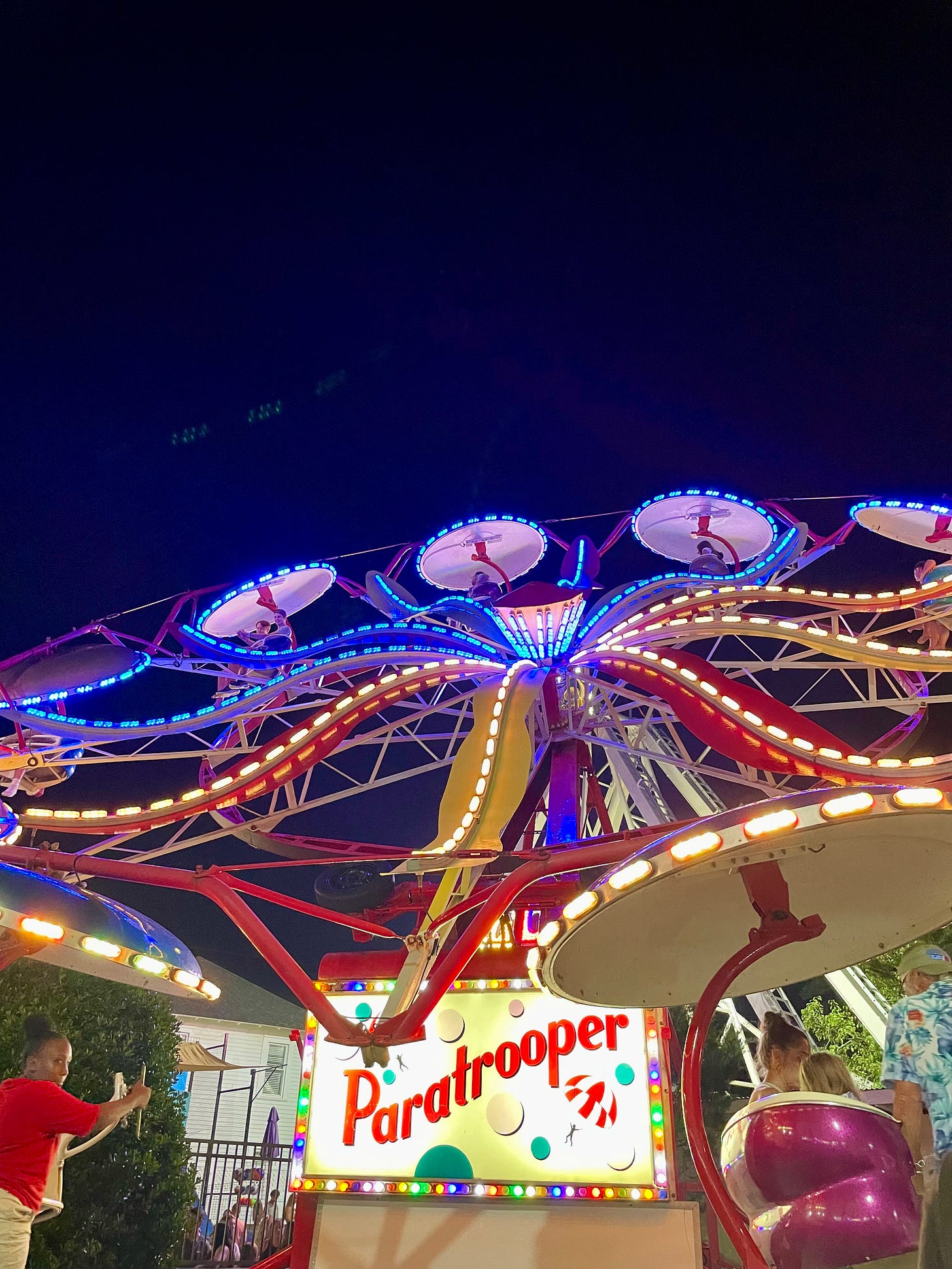Can You Rethink Just One Rule?
A simple experiment for creative living
I watched the Olympic opening ceremonies, and I loved all 17.5 hours of them, and yeah, because I’m a veritable volleyball of cheddar-y sentimentality, I wept.
Sure, I wept at Celine Dion’s performance—her vocal athletics, her glorious French sopranic triumph. But I also wept for the Parade of Athletes. I loved watching their joy.
At first, they looked a little dazed in wonderment, gazing across the rainy banks of the Seine from their boat rails, wearing clear ponchos over their special matching outfits. Then, all the sudden, their country’s name must have been called, or their faces must have made themselves known to them on a screen somewhere, because their eyes lit with sudden recognition—it was their turn! The world was watching them—and we were!
They hopped and hooted, jumped and laughed, shouted and shimmied, waving their various flags. And yeah, I cried. Because seeing people unabashedly joyful and proud of being is a beautiful thing.
Also, it strikes me as true: It is a beautiful thing, being alive. A terrible, hard, weird, scary thing, yeah, but a beautiful one, too. And the parade of athletes is a solid hour of performing this heroic truth. We are here. We are all here! On this planet! In these bodies! And yeah, some of these bodies can do unthinkably miraculous things.
Usually, the Parade of Athletes happens in an arena. In the first chunk of the Opening Ceremonies, we all watched various mimes and performance artists traipsed around Paris. I thought, “Okay, this is nice, but when will the ceremonies move into an arena? Where is the circle that the athletes will walk around? When will all this colorful theatrics land in an enclosed space?"
But the dancing continued around Paris, and the cameras focused on the Seine, and the athletes paraded in their boats, and I realized: There's no rule saying that the opening ceremonies has to happen in an arena. Not at all.
It made me wonder, what else are there no rules for?
What else do we keep making or doing in a certain way, only because it’s the way we’ve always made or done it before?
Sure, this question is useful in art-making. As a writer, I wonder: What conventions do I assume at the beginning of writing an essay or poem? How can I chuck just one convention out? Especially a convention that might rewrite the entire shape or feel of what I’m making?
But it’s also a useful question for creative living. What are some ways of doing things that I have accidentally turned into rules, even when they aren’t required?
"Meals happen at tables."
"A syllabus begins with assigned readings."
"Pants go over undies."?
(I mean, I feel relatively good about that last convention—it has served me well. But this is a thought experiment.)
I just finished listening to Catherine Price’s The Power of Fun. In it, she quotes Matt Haig, author of The Midnight Library: “Doing one thing differently is often the same as doing everything differently.”
And you definitely saw that if you watched Paris’s Opening Ceremonies. Getting rid of one large oval around which spectators sit—that changed everything. Suddenly, the athletes could take a long ride. On a boat. Down the Seine.
So this is my creative question lately.
What’s a rule I’ve followed that isn’t real?
What’s a way I’ve always done something that I could rethink?
What’s a convention I could chuck? Not to make something better, or worse… but just to see what new thing emerges.
I’m going to play with this question for a little while. In the meantime, I can already see how it’s worked for me in the past.
During the school year, I write first thing, after the kids are off to school, before I teach my classes. But the summer in my house is chaos. (I have written elsewhere about the utter lack of summer opportunities for kids with disabilities.) This summer, I gave up the “writing first-thing” principle. Often, I didn’t write at all.
Until I found that the awkward 5pm slot, when everyone’s tired and my kids are on screens but nobody’s hungry for dinner just yet, became the perfect time for writing.
My results didn’t produce anything close to the opening ceremonies. But they did help me feel more alive in my life. And that’s what tossing out a convention can sometimes help us do: feel more alive.
This brings me back to Catherine Price’s The Power of Fun. The book’s subtitle is “How to Feel Alive Again.” She argues that a lot of experiences people call “fun” actually contain a hint of rebellion. Nothing dangerous or overly stressful. Just things she calls “mildly naughty….acts of playful deviance…. Behav[ing] in ways that were unexpected, unusual, or mildly taboo.”
Her examples:
Ice cream for breakfast
Taking your work-lunch to the park
Going camping on Christmas Day
Wearing costumes in public on a day that is not Halloween
Price is careful to point out that she’s “not talking about rebellion that would hurt you, or anyone else, or put you in jail.” Instead, she says this practice is about “committing acts of harmless rebellion in which you deliberately step outside the bounds of your normal life and do something different just for the fun of it.”
She quotes play expert Dr. Stuart Brown, who says: “Play, by its very nature, is about stepping outside of normal life, and breaking some normal patterns. It is about bending rules of thought, action, and behavior.”
There’s no better season to experiment with your own rule-bending than summer.
As I write this, rain has started falling outside. It’s landing on the hot asphalt and wilted tomato garden. It’s begging someone to go outside and jump around in it!
Tell me: What convention would you like to bend a little, or break?
Try This:
If you’re interested in these ideas, here are a few next steps you can take.
As you go about your day, notice the rules you tend to follow. (E.g., a few of mine: “It’s a random Tuesday and I’m headed to Target so I will not put on a fancy dress.” OR: “It’s raining so we should stay inside.” OR “The people in my house are literally all around me so I cannot open a Word doc and write stuff.” Make a mental or actual list.
When you catch yourself abiding by a rule you’d like to creatively bend or break, go ahead and try it. See what happens. Or plan a time to bend or break it in the future—perhaps tomorrow or later this week.
Reflect: Did bending the rule help you feel more alive? Did it help you make or do something new?
Repeat each day.




Yes, I totally agree! I'm not sure why there was so much hate for the Opening Ceremonies, I think having the athletes on the Seine was innovative and memorable for the athletes and spectators. I also agree we tend to trap ourselves in the misconceptions that things have to be done a 'certain' way, which is incorrect. We should do what works best for us and try new things frequently.